Table of contents:
24 October 2011 - 30 October 2011
31 October 2011 - 6 November 2011
7 November 2011 - 13 November 2011
14 November 2011 - 20 November 2011
21 November 2011 - 27 November 2011
28 November 2011 - 4 December 2011
5 December 2011 - 11 December 2011
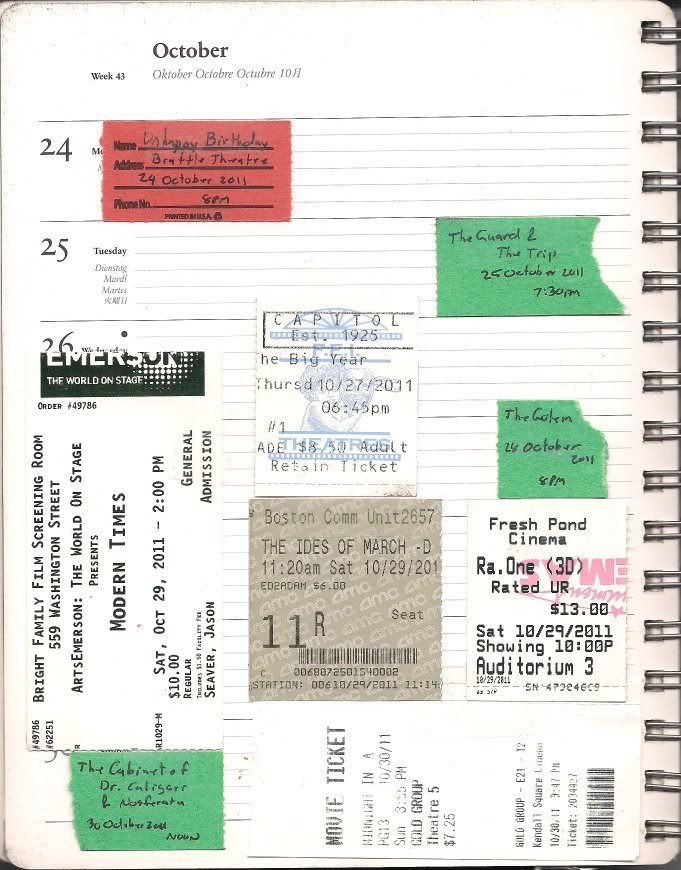
I was hoping to do a bunch of reviews on the Brattle's "Silent Screams" series, but not only did other things fill my time afterward, but I felt unusually knocked out that weekend, really dragging during a few movies . I wound up spending a lot of time at the Brattle that week, between CineCaché and the double feature and the silents, to the extent where the soda they serve there is actually starting to grow on me.
Of course, sometimes falling behind isn't really heartbreaking.
Unhappy Birthday
* ½ (out of four)
Seen 24 October 2011 in the Brattle Theatre (CineCaché)
Giving negative reviews to independent movies sucks, especially when the director notices you mentioning their movie on Twitter and asks you directly what you thought. That happened here, and there's really not a whole lot good to say about Unhappy Birthday. It's got an impressive opening sequence, a clever setting, and filmmakers who certainly seem to want to use the form to say something clever, but just don't have anything close to the skill to put it together.
The opening is connected to the setting; the town of Amen is perched on the end of a piece of coastal land so flat that it only acts as a peninsula at low tide' the rest of the time it is an island. Rick (David Paisley), his friend Sadie (Christina De Vallee), and his boyfriend Jonny (Jonathan Keane) are going there to give Sadie a very special birthday surprise - a reunion with her long-lost sister Corinne (Jill Riddiford). Actually, given that Sadie was a foundling, she's probably the long-lost one. Naturally, of course, the island turns out to be sinister.
I got to the theater just a bit after the start time, but didn't miss any of the movie because there were a couple of folks from the Boston LGBT Film Festival up front doing the intro, talking about "queer cinema" and "queer horror", which was nice in that it gave me a chance to get my coat off and sit down without messing with anybody watching the movie, and I get that the movie was made with a certain point of view, but it made me a bit worried, because they didn't really seem to be saying anything - there were words about how some movies scanned as straight or queer, but they weren't actually talking about whether or not the movie was scary.
And ultimately, that's what really sinks Unhappy Birthday - filmmakers Mark Harriott and Mike Matthews just don't tell a good scary story. It doesn't help at all that the movie is a mess on a technical level, with terrible sound mixing and photography that looked cheap and low-rez even from the back row. Yeah, it's independent, but there are a lot of good, cheap, consumer tools these days. That could be forgiven if the movie was well-told, but that was painfully amateurish, too. The filmmakers seem to be trying to replicate things that they have seen work in better horror movies without understanding what makes them effective or integrating them into the story (voyeuristic shots work much better with a voyeur, handheld cameras aren't automatically scary, etc.), creating a patchwork feeling that just never comes together. Characters change behavior drastically between scenes without explanation. Things get campy without the movie either fully committing to it or using it to make the horror aspects more shocking. And while individual scenes make sense, the totality doesn't. I'm cool with gay main characters and having sexuality be a big part of the story, but just because these things are relatively rare in the genre doesn't mean they're free passes.
There's actually some good work on the cast's part - Paisely, Keane, and De Vallee could make these characters the center of a genuinely good movie - but they're too thin as written and given too many dumb things to do. I'd certainly like to enjoy this movie, and maybe it works for those who think the "queer" part of "queer horror" is more important than the "horror" part (though I wouldn't presume to say), but it's just not scary, and not clever or even funny enough to make up for that.
The Trip
* * ¾ (out of four)
Seen 25 October 2011 in the Brattle Theatre (Recent Raves)
If you clicked the ticket looking for The Guard, head over here; I don't usually split a double feature, but this didn't fit in the "no reviews on EFC" theme of that post and I didn't really have a lot to say about it even right after I saw it (and I may have dozed off at some point, too).
It's an entertaining enough movie, at least, with UK personality Steve Coogan inviting his friend and frequent collaborator Rob Brydon along with him on a restaurant tour he'd originally planned to do with his much younger girlfriend (Brydon is a cheerfully domestic family man to Coogan's fame-loving sophisticate, at least in this fictionalized version of the pair). Conversation and mishaps ensue, with Coogan pondering whether he wants to move to Hollywood to star in a new CSI-type program. The famous dueling Michael Caines and the like are just as funny as billed, and the pair do have fine chemistry.
Interesting thing about the series - there was no writer listed on the print or IMDB, and checking the latter doesn't yield any writers' credits on the TV series that it was edited together from. A great deal of it is likely real and improvised, but there are some parts that are obviously scripted; I imagine those come from Coogan and Brydon as well. It's an odd set-up all around, really, and compacting the series to about half its length while keeping all the stops does lead to the film falling into a bit of a rut toward the end. The Trip is a well-improvised portrait of two middle-aged men with opposite perspectives, but it wasn't originally built as a movie, and sometimes that shows.
Der Golem, wie er in die Welt kam (The Golem)
* * ¾ (out of four)
Seen 28 October 2011 in the Brattle Theatre (Silent Screams)
I am pretty sure that even with a more appropriate soundtrack, The Golem would have its problems. When shown at the Brattle with a pre-recorded soundtrack by Frank Black (aka "Black Francis"), though, it was an object lesson in how precisely these things must be matched: The mood of the music seldom matched the picture, and brought something previously unseen out even less often, and that tended to highlight the flaws that were already present.
Because, let's face it, there's a big one here, which is that the plot is spurred into action by the emperor declaring that the Jews must be moved from the ghetto on account of their use of black magic, and Rabbi Loew (Albert Steinruck) deciding to fight this edict by... well, summoning a demon so that he might learn the magic words necessary in order to animate the soulless brute of the title. That is kind of ceding the high ground, there. Naturally, the golem (co-writer/director Paul Wegener) eventually goes out of control, endangering the whole community, most notably the Rabbi's daughter Miriam (Lyda Salmonova), who will likely need rescuing by her new secret Christian knight boyfriend Florian (Lothar Muthel).
The Golem is by no means whatsoever a bad movie; indeed, directors Carl Boese and Wegener put together a story that is often pretty thrilling, and looks very nice indeed for being made in 1920. It's got an appealing cast, too, particularly Wegener. His role, more that in many silents, involves a great deal of mime; even in motion, he looks like hard clay, and he's entirely convincing when going from impassivity to an almost-feral state. This movie was said to be a large influence on the James Whale Frankenstein, and that's in large part because Wegener and company give us a monster who, though in some ways a man, is in other ways decidedly less.
Still, it's hard to get over just how much of a mess parts are, especially the finale that sort of invites the jaw to drop - that's how you finish this? Ah, well - the movies still had some growing up to do when The Golem was made, and it manages to be a good yarn even if it has troubles as a story.
The Ides of March
* * * (out of four)
Seen 29 October 2011 in AMC Boston Common #11 (first-run)
Going into this, I had completely forgotten that George Clooney directed and co-wrote the movie as well as co-starring and producing. That's almost not fair; sure, it's not surprising that he might wind up following the same career path as Clint Eastwood and Robert Redford, but I don't recall either of them being much in the way of writers. It's almost unseemly for one guy to be publicly good at so many things.
But, let's back the praise up a little. The Ides of March isn't exactly a masterpiece, just an above-average movie, which is certainly nothing to sneer at. It's based on Beau Willimon's play "Farragut North" (changing the title from a bit of political nerdery to a Shakespeare reference makes it a little more inviting, I guess), and features Ryan Gosling as one of the chief lieutenants in the Presidential campaign of Governor Mike Morris (Clooney), with Philip Seymour Hoffman as the campaign manager, Paul Giamatti as the main primary opponent's campaign manager, and Evan Rachel Wood as a lovely young intern. Gosling's Stephen Meyers knows that he's in a ruthless business, but Morris has him just starry-eyed enough that he's still caught unexpected when little things become power struggles.
It's probably an artifact of having two movies where a certain limited affect is called for come out in such rapid succession, but Ryan Gosling is sort of a paradox as a lead actor: He always gives a good performance, but even when his characters get angry, there's something very distant and vague about him. Now, maybe I'm wrong about this - I've seen a few Facebook updates from younger cousins that certainly seem to indicate that girls go for him, and maybe his blankness is part of the appeal, a medium to project fantasies on. Compare him to his co-stars - Clooney, especially, is engaging and charismatic even though he's mean to be just as much of a cipher. Hoffman, Giamatti, Wood, Marisa Tomei, Jeffrey Wright, they all have something too.
Of course, having no easy hook into Gosling's character means that there are a great many directions the movie can go at any time, although there is something oddly muted about the whole thing - it's never quite as intense as it perhaps should be. A good story well-told, at the very least.
Das Cabinet des Dr. Caligari (The Cabinet of Dr. Caligari)
N/A (out of four)
Seen 30 October 2011 in the Brattle Theatre (Silent Screams)
So, the night before this screening, I went to see RA. One at Fresh Pond. It got out at around 12:30am, after the T had stopped running, so it was a half-hour or so walk back home in the snow (yeah, early snowstorm this year). It's almost impossible for me to fall asleep after that without reading for a bit, so I was pretty fuzzy the next morning, and I nodded off at some point during this, and I apparently completely missed the big twist that makes the movie famous.
I'll certainly re-watch it another time, because I love silents. They take a certain amount of concentration, though, which I just didn't have to give that day.
Nosferatu, eine Symphonie des Grauens (Nosferatu, a Symphony of Terror)
* * * * (out of four)
Seen 30 October 2011 in the Brattle Theatre (Silent Screams)
I've mentioned that this is my favorite vampire movie ever before, right? Yes, I have.
My opinion is more or less unchanged, although on the fourth or fifth viewing it does start to seem a little less perfect and a little more rickety. I hadn't seen a lot of silent movies when I first saw this one, so I was a bit bowled over by what a new experience this type of storytelling was. Still, I think it makes all the right decisions in adapting Dracula that other movies avoid in the name of humanizing the inhuman title character.
Midnight in Paris
* * * ½ (out of four)
Seen 30 October 2011 in Landmark Kendall Square #5 (first-run, amazingly)
I'm not quite the last person to see Midnight in Paris theatrically, but I certainly waited long enough: The movie was in its twentieth week or so at the Kendall, with a mere eleven days left to go there before heading over to Arlington for its second run. Forget being Woody Allen's biggest hit in a long time, that sort of longevity is almost unheard of anywhere.
Perhaps surprisingly, it's mostly deserved. Though there's still a bit of bitter old man to Midnight - the inevitable Allen-surrogate, Owen Wilson's Gil, can't mention his work in Hollywood without also mentioning that what comes out of there is crap - it's well ameliorated by the themes of the rest of the movie: The desire to live in the past, Gil learns, is seductive but there's no growth to come from it. It's not so much the present that's flawed but how one lives there.
Allen isn't close to subtle in getting this message across, but there's a sense of whimsy here that has seldom been present in his recent works, including the comedies. Part of it's the fantasy conceit of having Gil regularly catch a cab to the 1920s - even if Allen has something sincere and emotional to say, he's got to have a light touch or fall down the hole of making what the sci-fi/fantasy fans call "the mythology" make some sort of sense, and he's too smart to do that - but part of it seems to be just not being afraid to have some fun. There's a gag toward the end ("what happened to the detective") that shocked and delighted me because it was quick, funny, and kind of anarchic. It's the sort of thing that recent, serious-even-during-the-comedies Woody Allen just doesn't do.
I really hope he decides to do it more; I miss that Woody Allen, even if that's the sort of thing he tended to do before I was watching his movies.
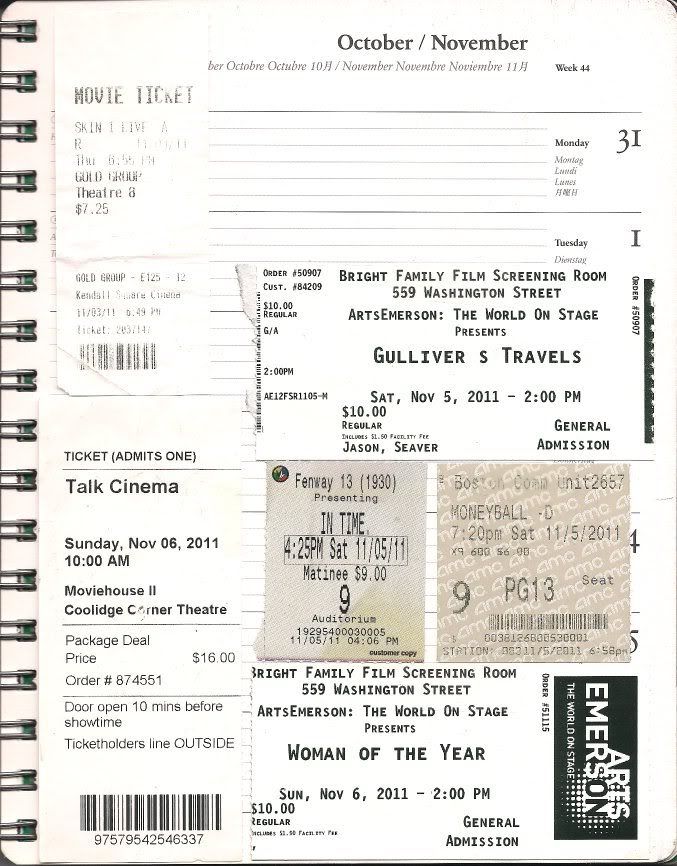
I started taking a Saturday-morning Japanese class at the Boston Language Institute this weekend, with the stated goal of being able to enjoy Toshiro Mifume performances in their entirety. Thus far, it has had the principle effects of (1) making me tremendously glad that English has an alphabet rather than two syllabaries and a gigantic collection of pictographs; (2) demonstrating that my study habits and general work ethic have sadly not improved noticeably since college; and (3) rearranging my Saturday moviegoing habits, as the cheap "AM Cinema" shows are out and I'm just a block away from Fenway when class lets out at 12:30pm. Also, lolling around the house all weekend has suddenly stopped being an option.
Gulliver's Travels (1939)
* * ¾ (out of four)
Seen 5 November 2011 in the Paramount Theatre Bright Screening Room (ArtsEmerson family shows)
Worth mentioning: The program started off with a pair of Fleischer brothers shorts, both fascinating/delightful in their own way: "Cobweb Hotel" (1936) is one I'm sure I've seen before, pretty typical of the period - rounded character designs and a musical framework that not only has the short structured around a song but has all the characters swaying to the beat. Still funny and kind of macabre, though, full of whimsy. The other was one of their Superman cartoons, "Billion Dollar Limited" (1942), in which Lois Lane is covering a shipment of gold that gets hijacked by some fast-driving gangsters, leading Superman to come to the rescue. It's an almost completely different style from "Cobweb Hotel", with realistic figures and less idiosyncratic voice work, along with serious thrills. I love their Lois, by the way, who gets in a fight with gangsters and winds up picking up their Tommy gun and opening fire.
It's worth mentioning these shorts because Gulliver's Travels falls in between them not just chronologically but stylistically; cartooning collides with realism, and the result is sometimes both interesting and a bit pretentious because of it. The Fleischers (as many adaptations do) focus on the Lilliput section of Jonathan Swift's book, and their depictions of the characters are interesting: The Lilliputians (as well as their rivals) are depicted as rounded cartoons drawn freehand, while Gulliver is rotoscoped. It's a bit of symbolism I'm not totally comfortable with - it depicts the Lilliputians as sub-human while Gulliver comes off too perfect, and too idealized. It seems like Gulliver should be seeing them reflecting human foibles, as opposed to coming across like a benevolent god amused by the antics of children.
Of course, it's been a while since I've read the source material in any form (I remember it mainly from what was certainly a simplified version read in elementary school), so director Dave Fleischer, producer Max Fleischer, and the five credited screenwriters may be closer to the mark than I think. It's not a bad movie - the cartooning is decent and the songs passable - but not quite up to the brothers' short work, either.
In Time
* * (out of four)
Seen 5 November 2011 in Regal Fenway #9 (first-run)
Part of what makes In Time so disappointing is that it seems to have arrived at exactly the right moment; on the face, it seems to be a fine allegory for the 1% manipulating the system so that they can thrive at the cost of the 99%'s very lives. It's got an author in Andrew Niccol who has proven himself quite skilled at telling stories in this sort of world, so long as you don't look too hard at the underpinnings (I buy that Gattaca could evolve, and to a lesser extent that The Truman Show could happen, though In Time seems like it would have to take place much further into the future than the tech on display implies - heck, it sometimes feels like a script from 1987 which doesn't take cell phones into consideration).
And yet, while it shares a whole bunch of Gattaca's DNA (it even illustrates its central point by having characters swim in the ocean!), it's also missing much of that movie's heart. The main characters are portrayed by an appealing young pair - I like Amanda Seyfriend and Justin Timberlake a lot, although both seem to be more suited for comedy - but they seldom seem to be much more than ciphers. I don't quite buy them as being more than class envy and liberal guilt, and that the movie doesn't have much more to say about societal inequity other than offering violence and theft as a solution makes things ring hollow. This could work if Niccol weren't so intent on the characters being considered heroic or pleasant, but he doesn't seem willing to go that dark.
Somewhere in the concept for In Time, there's a bit of sharp, uncompromising satire waiting to come out: At its core, it's about the deepening inequities in modern America, and how nobody questions the system because they believe that they can eventually work their way to the top even if the system is stacked against them. Niccol just doesn't go for the throat, though, and he's not good enough with the big sci-fi action to deliver great sizzle when the steak is absent.
Moneyball
* * * (out of four)
Seen 5 November 2011 in AMC Boston Common #9 (first-run)
Speaking of inequities between the rich and the poor, it says something that the happy ending to this movie about Oakland Athletics GM Billy Beane (Brad Pitt) trying to figure out how to make his team win with limited resources is that the much wealthier Boston Red Sox win the World Series. This Boston-based blogger is obviously completely okay with that, but I wonder what folks from Oakland think of that as the ending.
It's at least an entertaining, genial couple of hours, with the central message - that when you've got fewer resources to play with, you've got to figure out what your competitors are under-valuing and buy low - coming through strong. Pitt and Jonah Hill are an entertaining odd couple, and the script by Aaron Sorkin and Steven Zallian does a nice job of fleshing the business-centric plot out on a personal level.
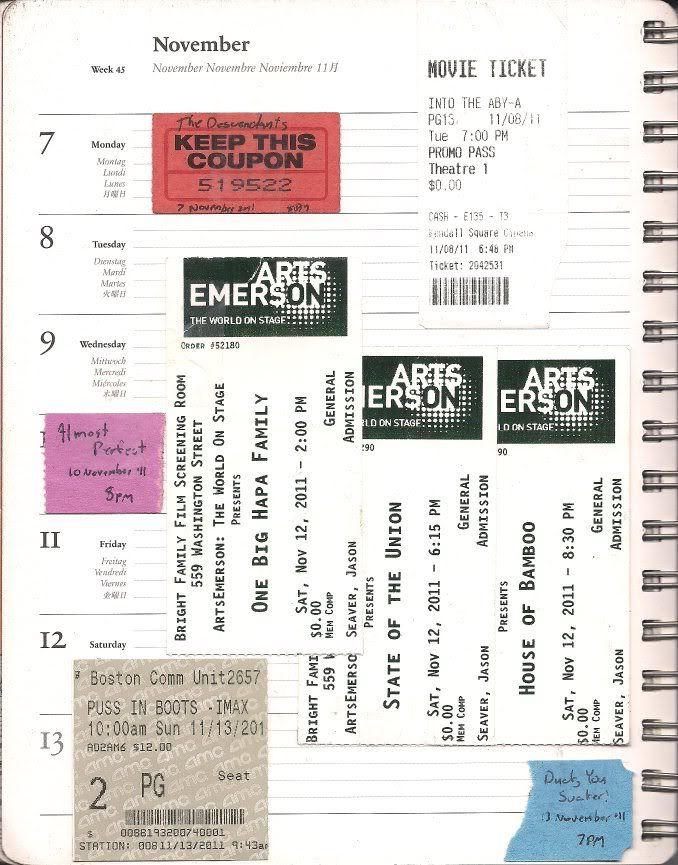
Busy, busy week, with two previews, two from the Boston Asian American Film Festival, a double feature at the Paramount, and then the two I'm just going to capsulize here because they're starting to fall out the back of my brain:
Puss in Boots
* * ½ (out of four)
Seen 13 November 2011 in AMC Boston Common #2 (first-run, digital IMAX 3D)
In theory, Puss in Boots should be the best spin-off movie imaginable: It's got a character who regularly stole scenes from the main characters of the movies he was in but was still a relatively blank slate, played by a star who can carry his own movie. By the end of the Shrek movies' run, who didn't enjoy Antonio Banderas's swashbuckling kitty more than Mike Myers's Ogre with a heart of gold? DreamWorks also wasn't shuttling the production off to some B-team, so this had a chance to be pretty good.
And the movie is handled ably enough - probably better than the last couple Shrek sequels - but Puss doesn't quite make the transition to leading character that well. "He's distracted by reflected dot of light, just like a real cat!" gags are no longer throwaways, but undercut the main character. The fairy tale supporting characters feel like they were designed to fit into Shrek's milieu, not Puss's. The movie never really feels like it's about Puss more than it is, say, Humpty Dumpty.
It's not bad, but in a year that is giving us some exceptional kid's/animated movies, the bar is a lot higher than "better than Shrek the Third"
Giù la testa (Duck, You Sucker!)
* * * ¼ (out of four)
Seen 13 November 2011 at the Harvard Film Archive (Sergio Leone)
I've not seen enough Sergio Leone, and the retrospective at the Harvard Film Archive sadly did not do enough to remedy that. Well, that's obviously placing the blame in the wrong place; me not heading to the HFA at every opportunity is to blame. A shame, especially since screenings there often come with informative mini-lectures; this one in particular had a lot of interesting detail, such as how Leone was not planning to do any more westerns, creating this one for a protege, but studio and stars continued to demand more personal involvement until he was directing the thing.
Leone's cynicism is much more prevalent - even more than in the "Man with No Name" trilogy, the action in Duck, You Sucker! takes place in a grimy world where nobody has enough money aside from the arrogant upper-class jerks Juan Miranda (Rod Steiger) and his family rob. Though flashbacks show Irishman John Mallory (James Coburn) as having once been a gentleman, he's fully assimilated into this world, although he has retained both a sort of idealism and a certain amount of disdain for the lower-class likes of Juan.
Of course, they eventually develop something resembling affection, even if they do continue to rub each other the wrong way more often than not. Leone comes up with a number of nifty missions for them, always with a dollop of tragedy and black humor to finish it off. It's not his greatest spaghetti western, but a good one, fueled by strong feelings and occasionally as incisive as it is action-filled.
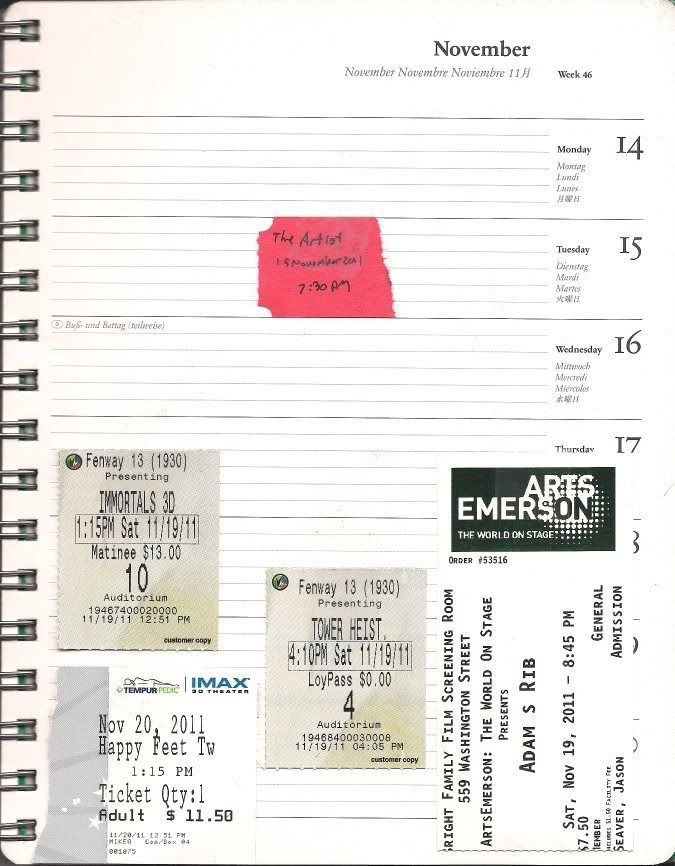
Another great preview, a lot of work, and then sticking around the Kenmore area after class on Saturday. I wasn't going there an awful lot before, but my Saturday morning language class has me in the area, so it's easier than taking the Red Line to the usual spots.
The restrictions on the free ticket you get at one of their loyalty program's checkpoints are nuts, though - no 3D, RPX, or anything still in "special engagement" territory (or roughly the first week and a half of its run). When I got one for seeing Immortals, I basically figured that Tower Heist couldn't be that bad, and, hey, who knew if there'd be something else I wanted to see with those restrictions before the coupon expired.
Immortals
* * ¾ (out of four)
Seen 19 November 2011 in Regal Fenway #10 (first-run, digital 3D)
I haven't seen either version of Clash of the Titans, and the last movie I saw before Immortals was The Artist, so maybe that's why the comparison that leaped to my head when I saw Immortals was not the movie with basically the same plot, but various German Impressionist silent fantasies like Fritz Lang's Die Niebelung. I don't know if that's a huge reach, considering that director Tarsem Singh Dhandwar's previous film was the silent-era/referencing The Fall; the point is that the ornamental costumes, the geometrical set design that seemed rather like something from the stage, and declamatory dialog felt like something out of that era.
And I kind of dig the movie for going that route. A lot of digital-backlot stuff is going to have that look anyway, and Tarsem made it work for him. He also merrily gives the audience what it wants on a very basic level: Everyone's armor has a form-fitting breastplate whether male or female, the fighting is creative (gods move at super-speed, but once a limb gets hacked off or blood spurts, it obeys normal laws of physics) and gory (lots of limbs get hacked off or mashed), and he understands and embraces the nutso aspect of adapting mythology for a modern audience. Gods arriving on Earth like they've been beamed down from the Enterprise? Why the hell not?
The trouble is, there's a lot of material between the crazy fighting scenes and the awe-inspiring images, and they are often dull at best, outright stupid at worst. The trouble with having gods in a story is that you have to come up with really arbitrary reasons for them not to interfere, which are just as arbitrarily discarded as soon as the writers hit a wall. Writers Charley & Vlas Parlapanides never really have a character do something for interesting reasons, and the cast doesn't invest them with enough for us to get involved beyond the cool imagery that Tarsem throws at us.
There's a lot of eye candy, don't get me wrong. It just has to do a lot of work to counteract the dumb around it, and considering that these are stories that have endured for millennia and were foundational to great civilizations, looking awesome should just be a bonus.
Tower Heist
* * ¼ (out of four)
Seen 19 November 2011 in Regal Fenway #4 (first-run, digital?)
I didn't really get the hate that the movie-lover circle has for Brett Ratner (and to a certain extent I still don't; being a crude jackass doesn't have much bearing on the quality of his movies and I don't recall reading much about that facet of his personality before). He's by no means an excellent filmmaker, but he's a capable-enough one who seems to be akin to the manager of a similarly-budgeted baseball team: His strategy isn't great but he manages personalities well and lets the stars do good work.
The trouble with a director like that, though, is that he's not going to help a film with real problems. Tower Heist has a nice cast, mostly in good roles for them, and they execute their bits pretty well. It's got a couple nice set pieces, especially once the big heist begins, and while Ratner doesn't turn in the most jaw-dropping action scenes of the year, he doesn't screw things up, and there's something to be said for that; it's a lot better than most directors do. This is at times a very fun, very capable movie.
What Ratner can't do, though, is take the flaws and do the things to make them work. He can't see that Eddie Murphy's character is usually on the wrong side of the line between "jackass" and "charming rogue". He and the four writers also make a few miscalculations where the caper material is concerned, not always adept at balancing the joys of a good plan executed well with those of a crew thinking on its feet.
None of these missteps exactly make Tower Heist into a bad film, even in aggregate. They're each opportunities to make it better than the raw materials, and that's something Ratner just can't do.
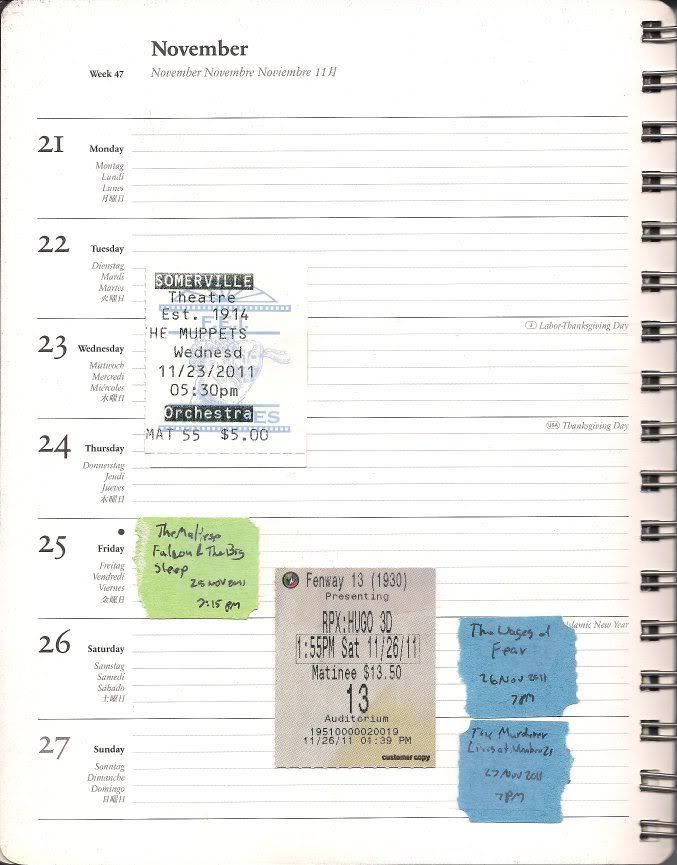
The rare skipped CineCaché screening this week, as I had seen Green at IFFBoston, director Sophia Takal was a last-minute cancellation, and I recall being dead tired when I got off the subway. It's a shame, as I really would have liked to have seen how a few months and a different context changed the Q&A. Back in April, Takal had done the Q&A with co-stars Kate Lyn Sheil and Lawrence Michael Levine, and as much as she struck me as quite nice, friendly, and instinctive, she was very deferential, giving a lot of credit to her boyfriend Lawrence and often passing him the microphone. I wondered if, on stage by herself, we might have heard much more about what she thinks.
Also, I'm not saying that I worked from home on Wednesday with the specific thought of getting to The Muppets on opening night, but I also didn't feel disappointed upon missing the bus.
The Maltese Falcon
* * * ¾ (out of four)
Seen 25 November 2011 in the Brattle Theatre (Giving Thanks for Bogie)
I've written this one up before, five and a half years ago, for a similarly titled series at the Brattle, and my opinion of it hasn't changed much. It's pretty brilliant, a great combination between pulp and noir, and Bogie's late speech about how it's useful to seem corrupt, but he just might be more honest than he appears is one of the great bits of tough-guy dialogue that goes against type.
I may have read the original novel at some point - I remember checking a volume with both The Maltese Falcon and The Thin Man out of the library sometime in high school - but I read a bunch of Dashiell Hammett's short stories just before this, including all of the other Sam Spade stories, and it's always fun to compare the way a character appears on page and on screen. In a lot of ways, Spade isn't that much different from "The Continental Op", Hammett's earlier protagonist (of Red Harvest and a great many short stories) on the page, especially when read far from the time the movie was created. In the books, Spade could almost be Philip Marlowe to a modern reader, but Bogart makes him a shark.
Previous review at eFilmCritic.
The Big Sleep
* * * ¾ (out of four)
Seen 25 November 2011 in the Brattle Theatre (Giving Thanks for Bogie)
As I mentioned last year, I love Philip Marlowe. I actually have a bunch of Raymond Chandler on my shelf now, and having worked by way through the books which have not been adapted into films, I will soon be reading the ones which I have seen on the big screen.
This is relevant because, after coming home from this double feature, I immediately opened my copy of The Big Sleep and flipped to the beginning to see just how much of it came directly from Chandler and how much came from the screenwriters (William Faulkner, Leigh Brackett, and Jules Furthman). It turns out that the scene of Marlowe entering the Sternwood mansion and speaking to the general is very close to verbatim, which doesn't surprise me: You don't mess with Chandler's dialogue. You just don't. I suspect that the process of adapting one of his books is seeing how much dialogue you can fit in, crying over having to cut the narration, and trying to streamline the plot in a way that you get to keep the best lines without becoming as confusing as this one can be.
Of course, I must confess, I wasn't really confused the first time I saw this movie. It wasn't until hearing about how the filmmakers would actually call Chandler to find out what happened that I started to notice how strung together the plot is. I'm looking forward to reading the book, both to see whether it's a mess from the source material and how much of Martha Vickers's character was cut, supposedly to appease Lauren Bacall and otherwise focus the movie on the suddenly-popular pairing of her and Bogart. There's the remnants of a great, potentially iconic performance in the movie, and though it appears to be mostly lost, I can at least read the lines with Vickers in my head, wondering what her career (and too-short life) would have been like had this not been cut.
Previous review at eFilmCritic.
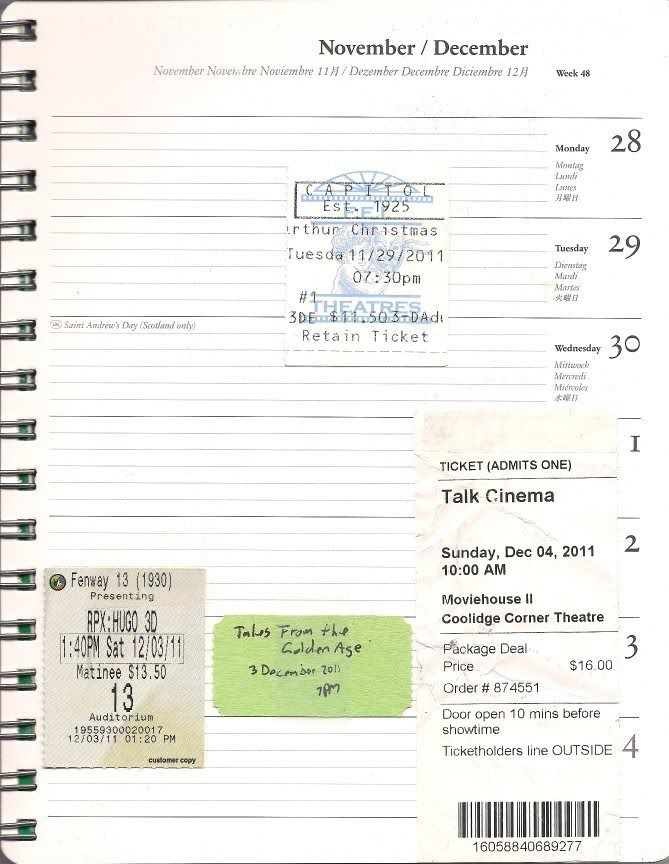
See those tickets in the lower left hand corner and the lower right hand corner? Those are the extremely rare repeat viewings of movies recently seen. The one on the right is The Artist, and I already had the ticket from having pre-paid for the Talk Cinema series; I'll probably buy another ticket to see it again at some point in January. Probably at the Coolidge again, because seeing it digitally at Boston Common would just be wrong.
As for Hugo... Yeah, I liked that a lot, and wanted to see it again while it was still playing in 3D on the very nice RPX screen (which, do to a quirk of pricing, isn't that much more expensive than a regular 3D screen). And, honestly, I'm tempted to do it again; it's one of the relatively few live-action 3D movies that uses the medium well, and I notice that in some cases, it appears to be playing in 2D even at venues that have 3D screens to spare. It's a bit of an ironic shame that theaters seem to be cutting down on 3D showings just as filmmakers and studios are finally figuring out how to use it.
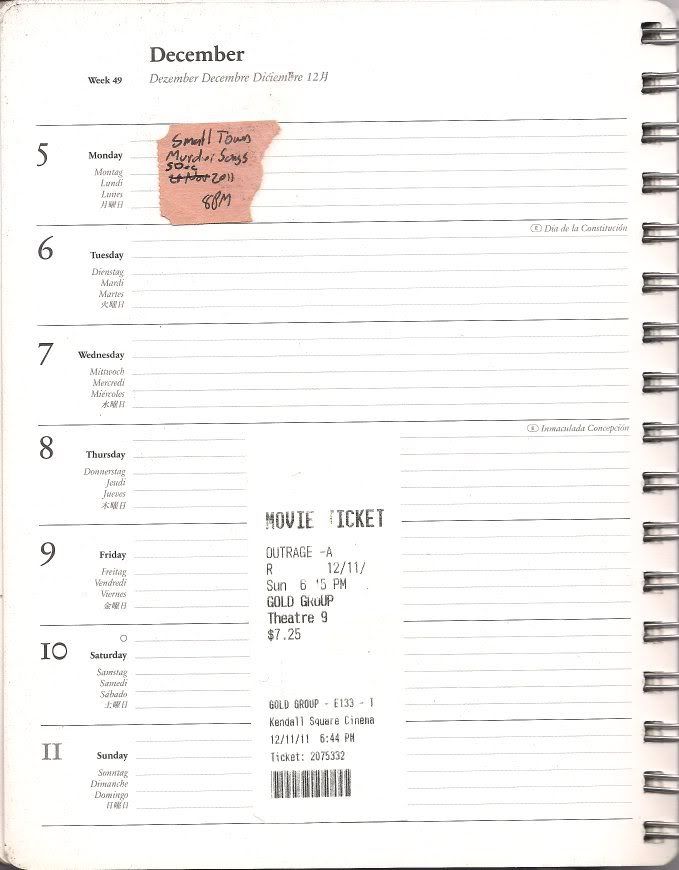
Stubless: Victim, in the living room on 10 December.
Man, I just didn't get to the movies much at all this week. I wonder if it was busy at work.
... So, that leaves me just a month behind, and a binge over the last week or two means getting caught up is going to be tricky. One of my resolutions for the new year is to make this actually timely and weekly, which I will certainly attempt to do.
At least, starting with the first full week of the new year (2 January - 8 January). In the meantime, there's a lot of writing to do.
No comments:
Post a Comment